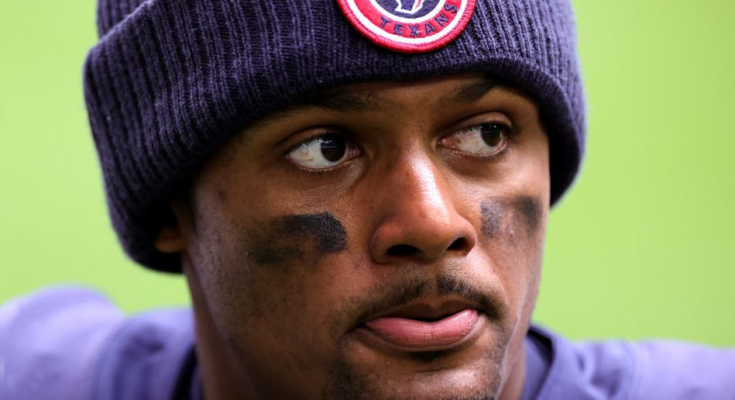As reported earlier today, multiple teams are willing to make a trade for Texans quarterback Deshaun Watson even if the 22 civil cases pending against him aren’t resolved. Another unresolved issue hovers over Watson’s short-term future, unrelated to the possibility of a prosecution.
Eventually, the NFL will decide whether to suspend Watson under the Personal Conduct Policy and, if so, the number of games he’ll miss. For now, the league has said or done nothing to reveal its intentions; as the league has learned from past experience (i.e., mistakes), there’s no reason to say or do anything until words or actions are absolutely necessary.
As to Watson, the league has had to do nothing. It hasn’t had to decide whether to put him on paid leave. It hasn’t had to decide whether to impose an unpaid suspension. Even if it already has developed a detailed flow chart showing what it will do based on the various potential ways the criminal and civil cases could conclude, the league has no reason to tell anyone what it plans to do.
The league’s possible decisions regarding Watson hinge largely on the criminal side of the case. If he’s indicted on one of more felony charges, for example, placement on paid leave becomes a virtual certainty. If he’s indicted on one or more misdemeanor charges, paid leave is possible but less likely. If he’s not charged at all, the league then will have to decide whether to impose punishment for the behavior that resulted in the criminal complaints, before the 22 civil cases are resolved.
The NFL sort of did that when suspending Antonio Brown for the first eight games of the 2020 season. The punishment was based on other off-field issues; the still-pending civil claim of sexual assault was left open while the litigation continued. After the case was settled, the NFL took no further action.
With Watson, who has no other off-field issues for which he could be punished, the league would have to decide whether to act after resolution of the criminal cases (even if he isn’t charged) but before the end of the civil lawsuits. The most relevant precedent (to the extent the league actually cares about complying with precedent) comes from Ben Roethlisberger’s case in 2010. The league suspended him six games, with a reduction to four, even though he wasn’t prosecuted for his alleged misconduct in Milledgeville, Georgia.
“I recognize that the allegations in Georgia were disputed and that they did not result in criminal charges being filed against you,” Commission Roger Goodell said in his letter to Roethlisberger. “My decision today is not based on a finding that you violated Georgia law, or on a conclusion that differs from that of the local prosecutor. That said, you are held to a higher standard as an NFL player, and there is nothing about your conduct in Milledgeville that can remotely be described as admirable, responsible, or consistent with either the values of the league or the expectations of our fans. . . . Your conduct raises sufficient concerns that I believe effective intervention now is the best step for your personal and professional welfare.”
Goodell also pointed out to Roethlisbeger “that I may impose discipline ‘even where the conduct does not result in conviction of a crime’ as, for example, where the conduct ‘imposes inherent danger to the safety and well being of another person.’” In Roethlisberger’s case, the Commissioner cited “irresponsible consumption of alcohol” along with purchasing alcoholic beverages for underage college students. “The Personal Conduct Policy also states that discipline is appropriate for conduct that ‘undermines or puts at risk the integrity and reputation of the NFL, NFL clubs, or NFL players,’” Goodell added. “By any measure, your conduct satisfies that standard.”
As to Watson, an extensive pattern of hiring massage therapists through social media with the possibility of sexual activity somewhere on the radar screen would be enough to justify the Commissioner taking action, if the Commissioner chooses to do so. While the specific facts are different from Roethlisberger’s case, the decision to impose discipline in order to rectify irresponsible behavior that reflects poorly on Watson and in turn his team and the league would justify a suspension.
Ultimately, it comes down (as it always does) to what the league wants to do. And that will be driven by the expected reaction to the various options, from a P.R. perspective. The entire Personal Conduct Policy apparatus arises from P.R. concerns; why wouldn’t each decision (especially the significant ones) ultimately be influenced largely if not exclusively by the question of how media and fans will react?
We won’t know how the league views this specific challenge as to Watson until the time comes to make a decision. That time is likely coming soon, especially if Watson ultimately faces no official criminal charges. While that would close the book on a potential prosecution, it would start the clock on the NFL taking action against Watson, as it did 12 years ago against Roethlisberger.



